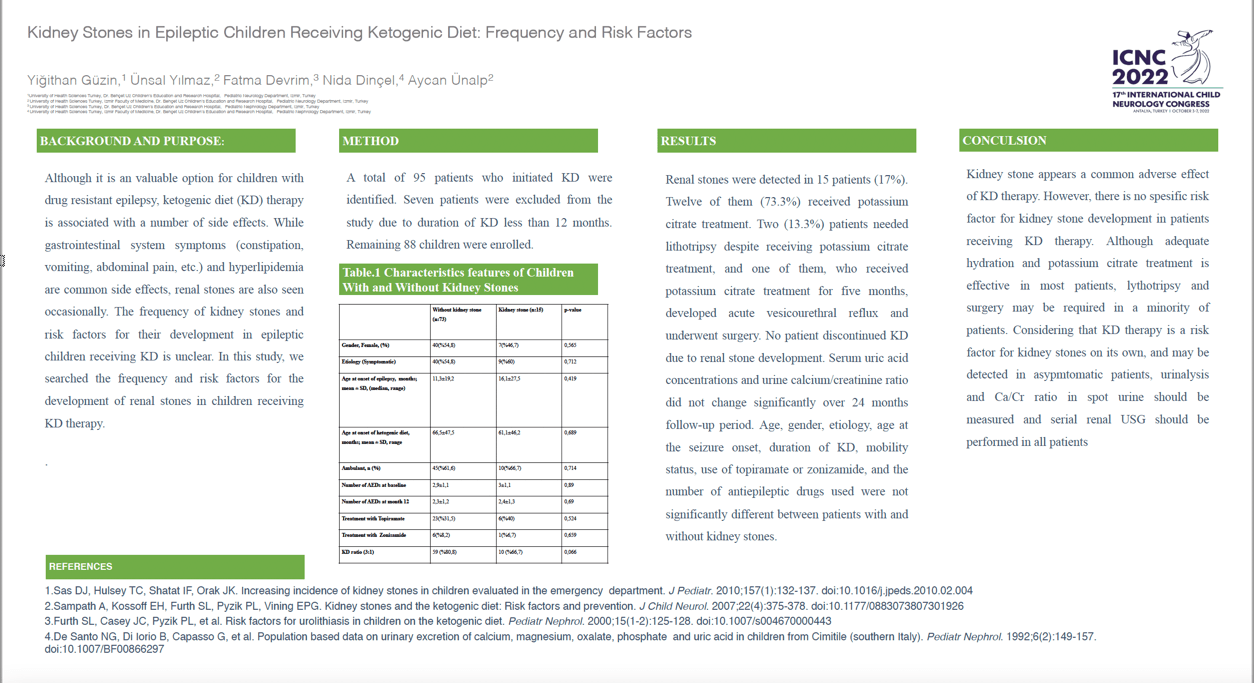Kidney Stone Formation İn Children Receiving Ketogenic Diet Therapy
Yiğithan Güzin, Ünsal Yılmaz, Nida Dinçel, Fatma Devrim, Aycan Ünalp
Introduction Epilepsy is the most common chronic neurological disease in childhood, with a prevalence of 0.5-1 percent in children. Ketogenic diet therapy(KDT) is an option for drug-resistant epilepsy treatment. KDT is associated with a number of side effects. In this study, we searched the frequency and risk factors for the development of kidney stones(KS) in children receiving KDT Method The demographic characteristics, gender, age of seizure onset, age at KDT initiation, duration of KD, and family history of KS were recorded. Results We enrolled eighty-eight patients in the study. KS formation was detected in 15 patients (17%). Twelve of these patients (73.3%) received potassium citrate treatment. Two (13.3%) patients needed lithotripsy despite receiving potassium citrate treatment. The effects of age, gender, etiology, seizure onset month, KDT receiving time, mobility status, and the number of antiepileptic drugs taken on KS formation were compared between patients with and without KS and there was no significant difference. (Table1) We found an increment in the ratio of Ca/Cr in spot urines with KDT compared to the baseline. Conclusion Patients who develop KS during KDT should be considered on a case-by-case basis. Considering that KDT is a risk factor for KS on its own, urinalysis and Ca/Cr ratio in spot urine should be measured in all patients, tests such as renal USG, uric acid should be sent, and the opinion of the pediatric nephrology department should be sought. All patients with or without KS should be followed up regularly with renal USG.
Keywords: Ketogenic diet therapy, Kidney stones, Epilepsy
Yiğithan Güzin
University of Health Sciences Turkey, Tepecik Education and Research Hospital
Turkey
Ünsal Yılmaz
University of Health Sciences Turkey, Izmir Faculty of Medicine, Dr. Behçet Uz Children's Education and Research Hospital
Turkey
Nida Dinçel
University of Health Sciences Turkey, Izmir Faculty of Medicine, Dr. Behçet Uz Children's Education and Research Hospital
Turkey
Fatma Devrim
University of Health Sciences Turkey, Dr. Behçet Uz Children's Education and Research Hospital
Turkey
Aycan Ünalp
University of Health Sciences Turkey, Izmir Faculty of Medicine, Dr. Behçet Uz Children's Education and Research Hospital
Turkey
Introduction Epilepsy is the most common chronic neurological disease in childhood, with a prevalence of 0.5-1 percent in children. Ketogenic diet therapy(KDT) is an option for drug-resistant epilepsy treatment. KDT is associated with a number of side effects. In this study, we searched the frequency and risk factors for the development of kidney stones(KS) in children receiving KDT Method The demographic characteristics, gender, age of seizure onset, age at KDT initiation, duration of KD, and family history of KS were recorded. Results We enrolled eighty-eight patients in the study. KS formation was detected in 15 patients (17%). Twelve of these patients (73.3%) received potassium citrate treatment. Two (13.3%) patients needed lithotripsy despite receiving potassium citrate treatment. The effects of age, gender, etiology, seizure onset month, KDT receiving time, mobility status, and the number of antiepileptic drugs taken on KS formation were compared between patients with and without KS and there was no significant difference. (Table1) We found an increment in the ratio of Ca/Cr in spot urines with KDT compared to the baseline. Conclusion Patients who develop KS during KDT should be considered on a case-by-case basis. Considering that KDT is a risk factor for KS on its own, urinalysis and Ca/Cr ratio in spot urine should be measured in all patients, tests such as renal USG, uric acid should be sent, and the opinion of the pediatric nephrology department should be sought. All patients with or without KS should be followed up regularly with renal USG.
Keywords: Ketogenic diet therapy, Kidney stones, Epilepsy
Yiğithan Güzin
University of Health Sciences Turkey, Tepecik Education and Research Hospital
Turkey
Ünsal Yılmaz
University of Health Sciences Turkey, Izmir Faculty of Medicine, Dr. Behçet Uz Children's Education and Research Hospital
Turkey
Nida Dinçel
University of Health Sciences Turkey, Izmir Faculty of Medicine, Dr. Behçet Uz Children's Education and Research Hospital
Turkey
Fatma Devrim
University of Health Sciences Turkey, Dr. Behçet Uz Children's Education and Research Hospital
Turkey
Aycan Ünalp
University of Health Sciences Turkey, Izmir Faculty of Medicine, Dr. Behçet Uz Children's Education and Research Hospital
Turkey

Yiğithan Güzin
University of Health Sciences Turkey, Tepecik Education and Research Hospital Turkey
University of Health Sciences Turkey, Tepecik Education and Research Hospital Turkey